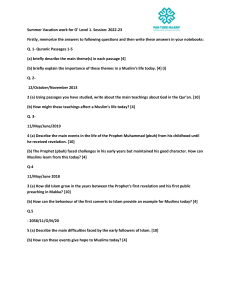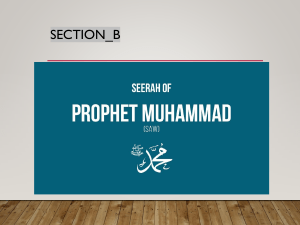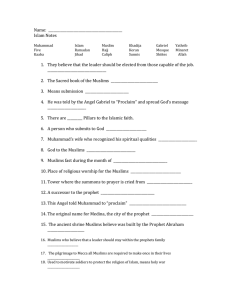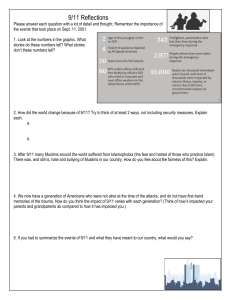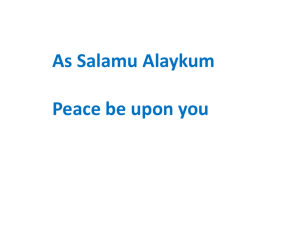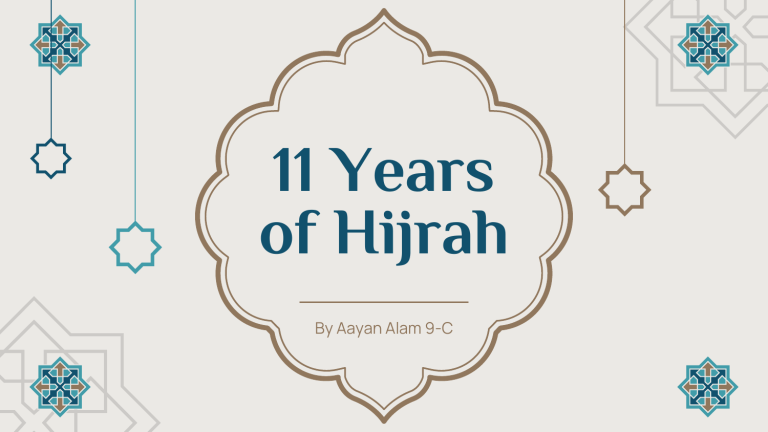
11 Years of Hijrah By Aayan Alam 9-C st 1 Year of Hijrah Construction of Mosque The first thing that the Prophet did after arriving in Madinah was to build a mosque. A suitable place was selected for the construction and the Prophet bought it from two orphans(Sahal and Sohail) for 10 gold coins. The Masjid was square in form, facing towards the north. The walls of the masjid were made of mud bricks, the roof was covered with palm leaves, twigs supported by the trunks of palm trees and the floor also made of palm leaves. The mosque came to be known as Masjid-e-Nabwi. A few rooms were also added for the Prophet and his family. It wasn’t only a place of worship but also a meeting place, parliament house and a military headquarter. Azaan In Madinah, a problem arose. The Prophet wanted to set up a way to summon the Muslims for prayers. Some suggested to blow trumpets like the Jews do or strike the bells like the Christians but the Prophet didn’t like these customs. Umar and Zaid both had a similar dream about learning the words of azaan. The Prophet was pleased by this wording and decided to adopt this custom. Bilal was appointed as the first person to deliver the azaan. Brotherhood The Muhajireen from Makkah had arrived in Madinah in a state of helplessness. They had left their properties and belongings for the sake of their faith and were in a state of great distress. Because of this, the Prophet established a brotherhood between the Muhajireen and Ansars. This brotherhood is also known as ‘Mawakhaat’. Each Ansar became a brother of the Muhajireen and they shared their wealth and property with them. The Brotherhood produced very healthy results as it finished extremely old enmities between the two tribes. It also helped to establish a powerful Muslim army. Charter of Madinah After establishing brotherhood between the two tribes, The Prophet turned his attention to the establishment of healthy relations between the Jews and Muslims. In this regard, the Prophet signed a treaty with the Jews and following are the conditions: 1. 2. 3. 4. 5. 6. 7. Jews and Muslims are politically one nation. If someone evades Madinah, they will defend it together. Jews of Madinah will not give refuge to the Quraish and their allies. In case of disputes, the decision of the Prophet will be final. In case of an attack, Jews and the Muslims will help each other. All the people of Madinah will bear the loss of the battle and share the benefits together. Murder will be prohibited in Madinah. The Jews and Muslims are free to follow their religion. They will show respect and tolerance towards each other. nd 2 Year of Hijrah Fasting, Zakat and Sacrifice At the end of 18 months of Hijrah, Fasting was made an obligatory ritual in the month of Ramadan. It was during this year that the payment of Zakat was also made obligatory by Allah. Furthermore, the sacrifice on the occasion of Eid Ul Adha was also advised during this year. The Prophet offered Eid prayer and sacrificed two goats. Change of Qibla Qibla is the direction in which a Muslim faces while their praying. When the Prophet migrated to Madinah, the qibla was the Al-Aqsa Mosque. However the Prophet wanted to face the Kabah while praying and Allah granted his wish. In the month of Shaban in 2 A.H, the qibla was change from Jerusalem to Kabah as a result of the divine revelation during the Zuhr prayer in a masjid, which is known as Masjid-e- Qiblatain. Battle of Badr The Quraysh were greatly displeased with the people of Madinah for giving shelter to the Prophet and the Muslims. When they asked the people of Madinah to hand them over, they rejected the offer which further aggravated them. So, to maintain their superiority they decided to fight the Muslims. Abu Sufyan was returning to Makkah with a trade caravan from Syria and the Prophet decided to intercept it on its way. However Abu Sufyan found out in time and diverted his route and also informed the Quraysh who sent a army of 1000. After Abu Sufyan reached safely, he called back his army but Abu Jahl insisted on advancing towards the Muslims. The battle took place in Badr, in 624 A.D on 17th Ramadan. Both the armies encamped at Badr and Muslims had a army of 313 men. Soon the battle began and three people from each side came forward to fight. From the Muslims Ali, Hamza and Ubaidah came and from the Makkans Utbah, Shayba and Walid stepped forward. Battle of Badr The Muslims won the individual combat. Then the general fight commenced and the Muslims emerged victorious despite being heavily outnumbered. Seventy pagans were killed and many were taken as prisoners. 14 Muslims were martyred during the battle The victory at Badr was the most important and decisive victory for the Muslims as it was their first battle. The victory inspired the Muslims and increased their faith in Allah. Seeing this many tribes of Madinah embraced Islam and many important leaders of the Quraysh had been killed. Expulsion of Banu Qainuqa Banu Qainuqa was the first Jewish tribe to break the treaty of Madinah with the Muslims. During the battle of Badr, the tribe didn’t help the Muslims even though they were bound to do as according to the treaty. Moreover, some tribe members insulted a woman in the market which started a fight and as a result a Muslim and a Jew were killed which further weakened their relationship. The Prophet surrounded their fortresses until they accepted defeat and were expelled from Madinah. rd 3 Year of Hijrah Battle of Uhud The Makkans could never even dream about the defeat at Badr. Due to this defeat, they had a fire burning in their heart for revenge. They wanted to crush the Muslims as they were a threat to their political influence and trade in Arabia. Defeat at Badr also put their pride and respect at stake. They couldn’t bear this insult and wanted to reclaim their superiority. The battle was fought in 625 A.D on 15th Shawwal. The Quraysh had an army of 3000 people including women. The Prophet got this news 3 days before their arrival and immediately held a meeting. They marched out of the city with a 1000 men, including 300 men of Abdullah Bin Obayi. The Muslims took their position upon the Uhud mountain to protect themselves from attacks. The Prophet also appointed 50 archers to guard the pass with strict instructions not to leave the position at any cost. Battle of Uhud When the war ensued, the Muslims fought bravely and killed many non-believers. In terror and confusion, the Makkans started to flee leaving behind their equipment. A number of Muslims started to seize the booty and the archers also left their post. Seeing this, Khalid Bin Waleed seized this opportunity and went round the mount and killed the archers. The Muslims found themselves in a hopeless situation and a confusion prevailed among them. A rumor was spread by the Makkans that the Prophet had been killed which disheartened the Muslims. However the Prophet was guarded by his companions. When the rumor had been exposed everyone rushed towards him for his protection. After that the battle continued and Hamza was martyred by Washshi, a slave of Hinda, wife of Abu Sultan to avenge the death of her father at Badr. After some time, the battle concluded and the Muslims faced a loss. Battle of Uhud The loss at Uhud was a great setback for the Muslims. Many important leaders were martyred during the battle such Hamza and Musab Bin Umair. The loss at Uhud was a great lesson for the Muslims to remain loyal and united in times of distress. This shows the importance of working together and avoiding disunity and greediness. th 4 Year of Hijrah Exile of Banu Nadeer After the loss at Uhud, the Jews of Banu Nadeer became very vocal about their opposition to the Muslims. They made contacts with the Quraysh and hypocrites in Madinah in an attempt to destroy the Muslim state. The Prophet went to Banu Nadeer for the share of the blood money who were mistakenly killed. They received him politely and asked him to sit beside a huge wall and secretly contrived a person throw a boulder on the Prophet. Jibreel came to inform the Prophet and Prophet returned to Madinah without saying anything. The Prophet sent them a message to leave within 10 days and when they refused to do so, they sieged their fortresses until they were exiled from Madinah. Prohibition of Alcohol Alcohol is forbidden in Islam as it makes the person lose their senses and impairs judgement. The prohibition of alcohol came gradually. First Allah explained the harm in alcohol far exceeds its benefits. Then the final prohibition came down explaining that alcohol leads to misguidance and forgetting of Allah. th 5 Year of Hijrah Battle of Trench After the Jews of Banu Nadeer were exiled from Madinah, the Jews wanted to take revenge from the Muslims. Therefore some Jewish leaders went to Quraysh to convince them to attack the Muslims and promised them full support. They also gave the same promise to the tribe of Banu Ghatafan and Banu Sulaiym. The victory at Uhud motivated the Makkans and the other enemies of Islam. The Battle of Trench was fought in 627 A.D. This time the Quraysh prepared an army of 10000 well-equipped men. When the Prophet got to know about this, he held a meeting. In the counsel he highlighted the opinion of Salman Farsi of digging a trench around the city to fortify it. The trench was completed in 20 days by 3000 sacred hands. When the Quraysh reached there, they were unfamiliar of this strategy. The Muslims also compelled them to stay away from the trench by throwing stones and arrows. Battle of Trench The siege lasted for around 30 days and they made several attempts to cross the trench but they failed. They were running out of supplies and the icy cold winds were getting to them. Allah sent a windstorm towards their direction which kept blowing their tents and cooking gear away and also sent angels to set terror into their hearts. They hurriedly left, leaving behind their possessions. The Muslims only lost 9 men during this battle. The battle of Trench proved to be decisive as it wasted all of the Makkan’s supplies. th 6 Year of Hijrah Treaty of Hudaibiyah In the month of Shawwal 6 A.H, when the Prophet saw in a dream that he was shaving his head after hajj, it meant that he should go on a pilgrimage. The Prophet decided to perform pilgrimage with his companions in the month of Zul-Qadah 6 A.H. Prophet along with 1400 Muslims left for Makkah in 628 A.D. When the Quraysh heard about their intentions, they prepared to resist. The Muslims adopted an unfamiliar route and stopped at Hudaibiya. Makkans sent Urwah to convince Prophet to return to Madinah but he was impressed by the faithfulness of the Muslims. Despite what Urwah told the Makkans about the Muslims, they still refused the entry. It was then that Uthman went to Abu Sufyan to seek permission for the performance of Umrah and assured them that there will be no harm. In the Muslim camp, a rumor spread that Uthman had been murdered. Prophet took a pledge under a tree to fight until death to take revenge of Uthman’s death. Treaty of Hudaibiya However Uthman returned soon after and the negotiation continued. This time The Quraysh leaders concluded a 10 year treaty. It included the following conditions: 1. Muslims shall return this year without performing Umrah. 2. They may come next year for Umrah but not for more than 3 days. 3. They shall visit the city unarmed. 4. Muslims will not take back any Muslims living in Makkah. 5. Peace between both parties would last for 10 years. 6. Any one of the Arab tribes may enter into an alliance with the Prophet. 7. Any Quraysh who flees to Madinah shall be returned, but any Muslim that flees to Makkah will not be returned. Treaty of Hudaibiya The Muslims weren’t satisfied with the conditions of the treaty as they regarded it as insulting to them. The treaty reflects Prophet’s inclination towards a peaceful resolution to all problems. This was a great victory for the Muslims because they weren’t occupied in wars or battles. The number of people who accepted Islam after the treaty was more than the preceding six years. th 7 Year of Hijrah Message to Kings and Emperors The Prophet prepared ambassadors among his companions for the rulers of the world to invite them to Islam. Prophet selected some companions and entrusted them with messages to various kings and rulers. Diyah was sent to Hercules, the Roman emperor, who was much impressed by what he was told but he didn’t accept it. Abdullah was sent to Chosroes, the Persian emperor, who tore the letter into pieces. On hearing this, Prophet prayed that may Allah tear his empire into pieces. Amr was sent to Negus, King of Abyssinia, who confessed his faith in Islam and wrote a reply addressing the Prophet. Hatib was sent to Maquqa, King of Egypt, who didn’t accept Islam but sent gifts to the Prophet. Message to Kings and Emperors Amr Bin As Sahmi was sent to the ruler of Oman and Bahrain. Both of them accepted Islam. Salith was sent to the Chief of Yemen who asked for a share of the Prophet’s kingdom in exchange of accepting Islam but Prophet refused to do so. Shuja was sent to Harith Ghassani, Governor of Syria, who was very angry and ordered his army to attack the Muslims but they never came. Expedition of Khayber The treaty of Hudaibiya led the Jews to thinking that the Muslims were weak. Therefore they got into touch with those who wanted to attack the Muslims. When the Prophet got to know about this, he initiated a strategy to counter them. He considered it more appropriate to march to Khayber. Thus he set out with 1600 believers from Madinah in the month of Moharram of 7th A.H and reach Khayber. Qamus was the strongest fort whose ruler was Marhab who was considered to be stronger than 1000 horsemen. The first battle was in Naim. A fierce battle took place and the fort was conquered. They captured other small forts with ease as well. But when they reached Qamus the fight prolonged to 20 days. Marhab came out of the fort and invite Ali for a combat who killed him in the first attack. Then a fierce battle started and the Jews surrendered. After losing Qamus, it was the end of the Jews. th 8 Year of Hijrah Battle of Muta The Prophet sent Harith to the ruler of Busra to invite him to Islam. When Harith reached there, he was killed by Shurabil, one of the governors of Hercules. Killing Harith was a declaration of war and the Prophet prepared an expedition of 3000 Muslims under the command of Zaid Bin Harith. When they reached Syria, they were greeted by an army of 200,000 soldiers. A fierce battle took place and Zaid fought well until he was martyred. Then Jafar took the flag and fought to his death as well. Then Abdullah bin Rawahah carried the flag until he was martyred. Then the lead was passed to Khalid Bin Waleed who adopted a different strategy to escape the destruction. He was successful in this and only 12 Muslims were martyred. The courage of the Muslims to stand up to the Roman Empire had many effects as many Arab tribes in Syria accepted Islam Conquest of Makkah The Khuza tribe had entered into friendly relations with the Prophet while on the other side Banu Bakr allied with the Quraysh. The Quraysh incited Banu Bakr to attack the Khuza tribe. One night when the Khuza were sleeping Banu Bakr attacked them and killed many of them. The Quraysh openly helped Banu Bakr and the Khuza tribe took shelter in the Kabah, but Banu Bakr still didn’t stop killing them. After Prophet found out about this he sent them 3 options. Either to pay blood money, The Quraysh have nothing to do with Banu Bakr or they should declare the treaty null and void. Quraysh chose the last option and on the 10th of Ramadan, Prophet set out with 10,000 people and marched towards Makkah peacefully. A little fight took place and 12 Makkans died while two Muslims were martyred. The Makkans took refuge in their homes or Abu Sufyan’s house. Prophet marched towards the Kabah and destroyed all the idols inside while the Quraysh were silently watching. Conquest of Makkah The Prophet showed an exemplary forgiveness to his enemies. He and his followers had been brutally tortured and oppressed in Makkah for 13 years. Their cruel persecution compelled the Muslims to migrate to Madinah. Yet they were all forgiven, even the most bitterest enemies by the Prophet. The Conquest of Makkah was a great achievement of the Prophet. It was a victory against the enemies who had tortured him cruelly and driven him out of this city. When Prophet emerged victorious, he did not hold any grudge against those who had abused them. Because of this act many people in Makkah accepted Islam. Battle of Hunain The ruling tribes of Taif , Banu Thaqeef, and Hawzain were still inhabiting the area between Makkah and Taif, and were still enemies of Islam. The Hawzain regarded Prophet as a threat to their religion. Malik Bin Auf, their chief, gathered 20,000 men and encamped in Hunain. When the Prophet heard about this, he left Makkah with 12,000 men. The Muslims were very well equipped and they were over confident about their victory. Malik appointed his best archers on the surrounding hills and the Muslims were met through a shower of arrows. Later wards, the fight recommenced and Muslims attacked the enemies in all fury. The enemy turned and fled to Taif. The victory was a severe blow to the Hawzain. The Muslims captured a booty of 24,000 camels, 40,000 sheeps, 4000 silver pieces and 6000 prisoners which was distributed amongst the soldiers. Siege of Taif Hawzains as a precaution stored enough provisions in Taif. After the battle, Prophet marched towards Taif. On reaching there he laid siege to it for a month. The enemies killed a number of Muslims and wounded them with shooting arrows. The Prophet consulted this with the Companions and they decided to return with conquering it. Later onwards Banu Thaqeef sent a deputation to Madinah and accepted Islam. Victory over Hawzain establish the superiority of Islam. All tribes now submitted to Islam almost without fighting. th 9 Year of Hijrah Tabuk Expedition The relations between Christians of the Syria and Muslims got tense after the battle of Muta. The Christians could not tolerate the spread of Islam and the growing unity of Arabia under Prophet. They became jealous of the fast growth of Islam. Romans collected a huge army at the borders of Syria. When the Prophet found out about this it became necessary to defend and protect Islam. It was a hot summer and there was hardly anything to eat. Prophet was able to ask the wealthy Muslims for supplies. He was able to collect an army of 30,000 men and 10,000 horses, the biggest army in the Arabian history. When Muslims reached Tabuk, they found out that the Romans got scared and retreated deep into their territory. The Arab tribes agreed to pay Jizya tax and many converted to Islam. th 10 Year of Hijrah Farewell Pilgrimage In the 10th year of Hijrah, Prophet told about his intentions of going on Hajj to Makkah. He sent messengers to all parts of Arabia to join the great pilgrimage. Tens of thousands of people responded and the number exceeded 100,000 people. Prophet left Madinah on 26th of Zul-Qadah, with his companions. After going 6 miles, he put on Ihram at Dul-Hulaifah. On the 5th of Zul-Hijjab, the Prophet reached Makkah and he stayed there till 8th Dhil Hajj. On the 8th of Zul-Hijjah, Prophet left Makkah for Mina and passed the night there. From Mina, he left for Arafat on the morning of 9th Dhil-Hajj. Sermon The last sermon of the Prophet is about the first universal charter of human rights. It declared the sanctity of life and property. It proclaimed equality and brotherhood. It also forbids usury or interest and bloodshed. It also protects the rights of wives and slaves. 11thYear of Hijrah Demise of the Prophet Two months after performing the farewell pilgrimage, the Prophet fell sick but carried his duties as usual. Prophet continued offering prayers in congregation until he became so sick that he could not move. After that Abu Bakr was ordered to lead the congregational prayers for several days. Four days before his demise, he felt some relief and took a bath before Zuhr. Afterwards he came out to the masjid supported by Abbas and Ali. After the prayer ended he addressed his companions. Then the illness became more serious. He felt better on the morning of Monday, 12th Rabi-ul-Awwal 11 A.H, but in the afternoon his condition worsened and in the evening he took his last breath.
